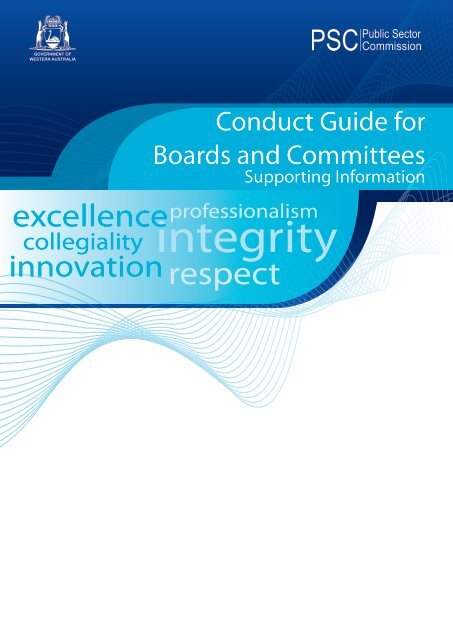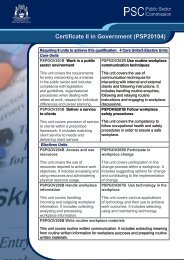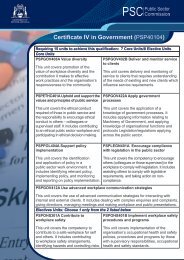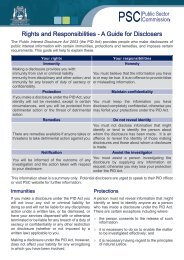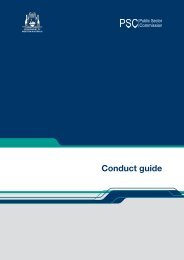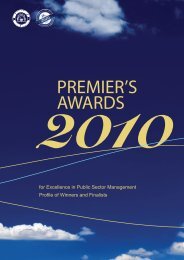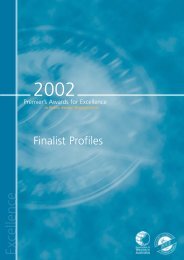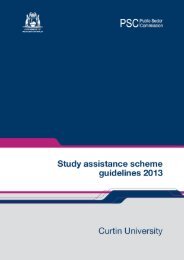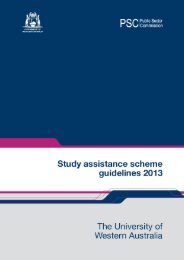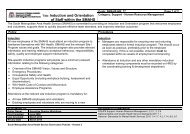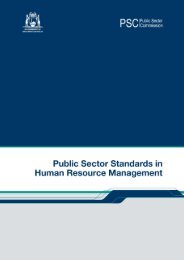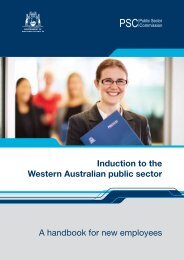Conduct Guide for Boards and Committees: Supporting Information
Conduct Guide for Boards and Committees: Supporting Information
Conduct Guide for Boards and Committees: Supporting Information
You also want an ePaper? Increase the reach of your titles
YUMPU automatically turns print PDFs into web optimized ePapers that Google loves.
GOVERNMENT OF<br />
WESTERN AUSTRALIA<br />
<strong>Conduct</strong> <strong>Guide</strong> <strong>for</strong><br />
<strong>Boards</strong> <strong>and</strong> <strong>Committees</strong><br />
<strong>Supporting</strong> In<strong>for</strong>mation<br />
excellence professionalism<br />
collegiality<br />
integrity<br />
innovation respect
Contacts<br />
Office location:<br />
Governor Stirling Tower<br />
197 St Georges Terrace<br />
Perth WA 6000<br />
Postal address: Locked Bag 13<br />
Cloisters Square<br />
Perth WA 6850<br />
Telephone: (08) 9219 6000<br />
Facsimile: (08) 9219 6001<br />
Toll free: 1800 676 607<br />
Internet:<br />
Email:<br />
www.publicsector.wa.gov.au<br />
admin@psc.wa.gov.au<br />
Availability in other <strong>for</strong>mats<br />
If you have a disability you can request this publication in an alternative <strong>for</strong>mat.<br />
People who have a hearing or speech impairment may call the ACE National Relay Service on<br />
133 677 <strong>and</strong> quote telephone number (08) 9219 6000.<br />
The document is available in PDF <strong>for</strong>mat at www.publicsector.wa.gov.au<br />
Published by the Public Sector Commission<br />
December 2010<br />
2 Public Sector Commission
Acknowledgements<br />
This supporting in<strong>for</strong>mation <strong>for</strong> developing a code of conduct <strong>for</strong> government boards <strong>and</strong><br />
committees draws on the collective knowledge <strong>and</strong> experience of many people <strong>and</strong> organisations.<br />
We acknowledge in particular the Principles of Good Corporate Governance <strong>for</strong> Western<br />
Australian Public Sector <strong>Boards</strong> <strong>and</strong> <strong>Committees</strong> <strong>and</strong> the associated supporting guidelines <strong>and</strong><br />
application aids produced by the Public Sector Commission.<br />
<strong>Conduct</strong> <strong>Guide</strong> <strong>for</strong> <strong>Boards</strong> <strong>and</strong> <strong>Committees</strong> - <strong>Supporting</strong> In<strong>for</strong>mation<br />
i
Contents<br />
How to use this supporting in<strong>for</strong>mation 1<br />
The Western Australian Public Sector Code of Ethics 2<br />
Scope of the Western Australian Public Sector Code of Ethics 2<br />
Why have a code of conduct <strong>for</strong> boards <strong>and</strong> committees 3<br />
The <strong>Conduct</strong> <strong>Guide</strong> <strong>for</strong> <strong>Boards</strong> <strong>and</strong> <strong>Committees</strong> 4<br />
Categories of conduct - Sample of issues <strong>for</strong> inclusion 5<br />
Personal behaviour 5<br />
Communication <strong>and</strong> official in<strong>for</strong>mation 8<br />
Fraudulent <strong>and</strong> corrupt behaviour 10<br />
Use of public resources 12<br />
Record keeping <strong>and</strong> use of in<strong>for</strong>mation 18<br />
Conflicts of interest 21<br />
Other considerations <strong>for</strong> inclusion 23<br />
Public sector employees on boards or committees 23<br />
Where to get support when issues arise 23<br />
Compliance with the Western Australian Public Sector Code of Ethics <strong>and</strong> codes of conduct 24<br />
Taking action in response to the code 25<br />
Other resources 26<br />
ii<br />
Public Sector Commission
How to use this supporting in<strong>for</strong>mation<br />
You should use this supporting in<strong>for</strong>mation in conjunction with the <strong>Conduct</strong> <strong>Guide</strong> <strong>for</strong> <strong>Boards</strong> <strong>and</strong><br />
<strong>Committees</strong>. The aim is to promote good practice by providing you with in<strong>for</strong>mation about what<br />
types of issues should be included within a code of conduct <strong>for</strong> Western Australian public sector<br />
boards <strong>and</strong> committees. It is by no means exhaustive. When developing a code of conduct,<br />
those responsible (<strong>for</strong> most boards, this will be the executive officer) should check their enabling<br />
legislation to ensure that this includes specific legislative roles <strong>and</strong> obligations of their board.<br />
In this document, “member” means a board or committee member duly appointed by the<br />
Governor, a minister or other relevant authority. The term “board” also includes committees. The<br />
term “executive officer” includes officers who provide a secretariat function <strong>for</strong> the board. The<br />
term “officer” means a person who is part of the public sector as defined in section 3 of the Public<br />
Sector Management Act 1994 (PSM Act).<br />
These guidance notes take into account the Western Australian Public Sector Code of Ethics<br />
(Code of Ethics), applicable under the PSM Act to public sector bodies. These include boards<br />
created <strong>for</strong> a public purpose under Western Australian legislation. Accordingly, boards <strong>and</strong><br />
committees created <strong>for</strong> a public purpose must observe <strong>and</strong> comply with the Code of Ethics.<br />
While it is not m<strong>and</strong>atory under the PSM Act <strong>for</strong> boards <strong>and</strong> committees to have their own code of<br />
conduct, they are strongly encouraged to do so. Commissioner’s Circular 2009/08 – Requirement<br />
<strong>for</strong> all public sector agencies to develop codes of conduct makes the point that a code of<br />
conduct is an effective <strong>and</strong> positive way to highlight to all members their public duties <strong>and</strong> legal<br />
responsibilities. Whether you choose to develop your own code of conduct using the conduct<br />
guide <strong>and</strong> supporting in<strong>for</strong>mation, or modify an existing code, it will be binding on all members.<br />
In this supporting in<strong>for</strong>mation, some comments are intended to provoke thought <strong>and</strong> consideration.<br />
These may not necessarily <strong>for</strong>m part of a completed code of conduct <strong>for</strong> your board. In other parts<br />
you may consider example statements when developing a code if they suit the circumstances <strong>and</strong><br />
particular needs of your board or committee.<br />
If you have any further enquiries about creating your own code, please contact a consultant at the<br />
Public Sector Commission (PSC). You may also find it useful to use these notes in conjunction<br />
with the Principles of Good Corporate Governance <strong>for</strong> Western Australian Public Sector <strong>Boards</strong><br />
<strong>and</strong> <strong>Committees</strong>, available from the PSC website.<br />
<strong>Conduct</strong> <strong>Guide</strong> <strong>for</strong> <strong>Boards</strong> <strong>and</strong> <strong>Committees</strong> - <strong>Supporting</strong> In<strong>for</strong>mation 1
The Western Australian Public Sector Code of Ethics<br />
The st<strong>and</strong>ards of conduct <strong>and</strong> integrity <strong>for</strong> all public sector employees are expressed in the<br />
following principles.<br />
Personal integrity<br />
We act with care <strong>and</strong> diligence <strong>and</strong> make decisions that are honest, fair, impartial, <strong>and</strong> timely, <strong>and</strong><br />
consider all relevant in<strong>for</strong>mation.<br />
Relationships with others<br />
We treat people with respect, courtesy <strong>and</strong> sensitivity <strong>and</strong> recognise their interests, rights, safety<br />
<strong>and</strong> welfare.<br />
Accountability<br />
We use the resources of the state in a responsible <strong>and</strong> accountable manner which ensures<br />
the efficient, effective <strong>and</strong> appropriate use of human, natural, financial <strong>and</strong> physical resources,<br />
property <strong>and</strong> in<strong>for</strong>mation.<br />
Scope of the Western Australian Public Sector Code of Ethics<br />
The Code of Ethics applies to all public sector employees. This includes CEOs, chief employees<br />
<strong>and</strong> ministerial staff, <strong>and</strong> public sector bodies covered by the PSM Act, including boards <strong>and</strong><br />
committees established under their own legislation.<br />
The PSM Act will apply where that board or committee is established or continued <strong>for</strong> a public<br />
purpose under a written law. Members of government boards <strong>and</strong> committees are subject to a<br />
range of statutory <strong>and</strong> legal obligations. Board members must become familiar with their legal<br />
duties <strong>and</strong> responsibilities.<br />
The Public Sector Commissioner has a responsibility to monitor the compliance of public sector<br />
bodies (including boards <strong>and</strong> committees) with the general principles of official conduct, the<br />
Western Australian Public Sector Code of Ethics <strong>and</strong> codes of conduct adopted by these bodies.<br />
2 Public Sector Commission
Why have a code of conduct <strong>for</strong> boards <strong>and</strong> committees<br />
People from all over Western Australia serve on government <strong>and</strong> public sector boards, often as<br />
volunteers. An appointment to a board carries with it responsibilities <strong>and</strong> obligations. Ignorance<br />
about those responsibilities can damage both the individual <strong>and</strong> the organisation they serve.<br />
People chosen as directors <strong>and</strong> committee members should underst<strong>and</strong> their responsibilities. This<br />
will help them to contribute in a positive way.<br />
At induction all new board members should be advised about how to fulfil their role, <strong>and</strong> given<br />
a copy of the code of conduct applying to them. The code will set the st<strong>and</strong>ard of conduct <strong>and</strong><br />
integrity expected of board members, executive officers <strong>and</strong> other officers working with the board.<br />
In per<strong>for</strong>ming their responsibilities, boards must work with the responsible minister <strong>and</strong>, in many<br />
cases, with the CEO of a public sector agency. Under some legislation, the responsible minister<br />
may give a written direction to the board <strong>and</strong> the board must give effect to it. In practical terms, a<br />
CEO must, in addition to the board, cooperate constructively with the responsible minister <strong>and</strong> his<br />
or her office staff. This can involve a high volume of daily communications <strong>and</strong> interactions. The<br />
Public Sector Commissioner is the employing authority <strong>for</strong> CEOs.<br />
A board should not direct a public sector employee to act contrary to the Code of Ethics, or a code<br />
of conduct applicable to that employee.<br />
<strong>Conduct</strong> <strong>Guide</strong> <strong>for</strong> <strong>Boards</strong> <strong>and</strong> <strong>Committees</strong> - <strong>Supporting</strong> In<strong>for</strong>mation 3
The <strong>Conduct</strong> <strong>Guide</strong> <strong>for</strong> <strong>Boards</strong> <strong>and</strong> <strong>Committees</strong><br />
PSC developed the <strong>Conduct</strong> <strong>Guide</strong> <strong>for</strong> <strong>Boards</strong> <strong>and</strong> <strong>Committees</strong> to assist government boards<br />
develop a code of conduct. This supporting in<strong>for</strong>mation should be read in conjunction with the<br />
conduct guide when developing a code of your own.<br />
The conduct guide sets out six categories where a public sector board member, executive officer<br />
or other officer of the board needs to display the appropriate behaviour <strong>and</strong> comply with the<br />
accountability framework set out in the legislature <strong>and</strong> by government.<br />
The supporting in<strong>for</strong>mation is consistent with the conduct guide. The six areas that should be<br />
reflected in your board or committee’s code of conduct are:<br />
●●<br />
●●<br />
●●<br />
●●<br />
●●<br />
●●<br />
Personal behaviour<br />
Communication <strong>and</strong> official in<strong>for</strong>mation<br />
Fraudulent <strong>and</strong> corrupt behaviour<br />
Use of public resources<br />
Record keeping <strong>and</strong> use of in<strong>for</strong>mation<br />
Conflict of interest<br />
The supporting in<strong>for</strong>mation provides the detail of the accountability framework, broken down into<br />
legislation <strong>and</strong> across-government requirements such as Premier’s Circulars <strong>and</strong> Treasurer’s<br />
Instructions. These are common to all public sector agencies <strong>and</strong> most public sector boards, <strong>and</strong><br />
are m<strong>and</strong>atory.<br />
The conduct guide is specifically aimed to help the executive officer of a board or committee<br />
fulfil their duties. It will help them allocate appropriate responsibilities to themselves <strong>and</strong> other<br />
members. It is the responsibility of each board to establish all of the legislation which governs the<br />
activities of the board.<br />
Referencing your board’s code of conduct to the <strong>Conduct</strong> <strong>Guide</strong> <strong>for</strong> <strong>Boards</strong> <strong>and</strong> <strong>Committees</strong> will<br />
ensure that you include the appropriate legislative obligations without necessarily having to restate<br />
specific requirements in the document. You should make sure that board members are aware<br />
of the conduct guide <strong>and</strong> supporting in<strong>for</strong>mation, <strong>and</strong> how to access the legislation <strong>and</strong> other<br />
government requirements it encompasses.<br />
4 Public Sector Commission
Categories of conduct - Sample of issues <strong>for</strong> inclusion<br />
Personal behaviour<br />
Board members are in a position of trust. Their involvement may effect the welfare, rights or<br />
entitlements of the community <strong>and</strong> individuals.<br />
Government power comes from citizens, who expect public officers to carry out their functions<br />
with professional integrity <strong>and</strong> due regard <strong>for</strong> the public interest. All board members need a clear<br />
underst<strong>and</strong>ing of their public duty <strong>and</strong> legal responsibilities.<br />
Example statements<br />
Board members will underst<strong>and</strong> the board’s role <strong>and</strong> public duties<br />
●●<br />
●●<br />
●●<br />
●●<br />
●●<br />
Gain a clear underst<strong>and</strong>ing of the role or purpose of the board as well as the<br />
statutory <strong>and</strong> regulatory requirements affecting members in carrying out their<br />
public duties.<br />
Underst<strong>and</strong> the physical, political <strong>and</strong> social environment in which the board<br />
operates.<br />
Stay in<strong>for</strong>med about all relevant activities affecting the board.<br />
Comply with legal obligations <strong>and</strong> implement the decisions taken by the board.<br />
Underst<strong>and</strong> <strong>and</strong> strive to fulfil the expectations of board member behaviours.<br />
This includes the level of accountability, probity <strong>and</strong> transparency expected in<br />
the public sector <strong>and</strong> the WA Public Sector Code of Ethics.<br />
Board members will be active<br />
●●<br />
●●<br />
●●<br />
Attend all board meetings. If they cannot attend members will submit an<br />
apology. If they are likely to miss several consecutive meetings, members could<br />
obtain leave of absence.<br />
Participate actively <strong>and</strong> work cooperatively with fellow members <strong>and</strong><br />
stakeholders to achieve agreed goals.<br />
Prepare <strong>for</strong> meetings by reading <strong>and</strong> considering papers circulated with the<br />
agenda.<br />
Board members will respect each other<br />
●●<br />
●●<br />
●●<br />
Treat each other with professionalism, courtesy <strong>and</strong> respect.<br />
Do not improperly influence other board members.<br />
Act loyally <strong>and</strong> in good faith.<br />
<strong>Conduct</strong> <strong>Guide</strong> <strong>for</strong> <strong>Boards</strong> <strong>and</strong> <strong>Committees</strong> - <strong>Supporting</strong> In<strong>for</strong>mation 5
Accountability framework<br />
Legislation<br />
●●<br />
Public Sector Management Act 1994 - s.8: General principles of human resource<br />
management, s.9: Act with integrity when per<strong>for</strong>ming official duties, comply with ethical<br />
codes <strong>and</strong> the public sector st<strong>and</strong>ards in human resource management<br />
●●<br />
Corruption <strong>and</strong> Crime Commission Act 2003<br />
●●<br />
Criminal Code Chapter XII Corruption <strong>and</strong> Abuse of Office<br />
●●<br />
Equal Opportunity Act 1984<br />
●●<br />
Occupational Safety <strong>and</strong> Health Act 1984<br />
●●<br />
Industrial Relations Act 1979<br />
●●<br />
Working with Children (Criminal Record Checking) Act 2004<br />
●●<br />
Disability Services Act 1993<br />
●●<br />
Statutory Corporations (Liability of Directors) Act 1996<br />
●●<br />
Board’s enabling legislation<br />
Across government requirements<br />
●●<br />
●●<br />
●●<br />
Code of Practice Occupational Safety <strong>and</strong> Health in the Western Australian Public<br />
Sector - promotes strategies to help CEOs, managers <strong>and</strong> officers improve the work<br />
environment <strong>and</strong> ensure compliance with the Occupational Safety <strong>and</strong> Health Act 1984<br />
(Public Sector Commissioner’s Circular 2009-11)<br />
Coordination of Public Sector Labour Relations - compliance with the coordination<br />
framework <strong>for</strong> labour relations is required, including circulars issued by the Department<br />
of Commerce (Premier’s Circular 2009/01) - available at www.commerce.wa.gov.au<br />
State Government Access <strong>Guide</strong>lines <strong>for</strong> In<strong>for</strong>mation, Services <strong>and</strong> Facilities - boards<br />
to fulfil social <strong>and</strong> legislative responsibilities by ensuring service accessibility by all<br />
customers, including people with a disability (Premier’s Circular 2003/08)<br />
6 Public Sector Commission
●●<br />
●●<br />
●●<br />
●●<br />
●●<br />
●●<br />
●●<br />
●●<br />
●●<br />
●●<br />
●●<br />
●●<br />
Whole of Government Complaints Management Strategy - boards’ complaints<br />
management systems must con<strong>for</strong>m to Australian St<strong>and</strong>ard 4269 (Public Sector<br />
Commissioner’s Circular 2009-27)<br />
Equity <strong>and</strong> Diversity Plan - Government’s commitment to a public sector that represents<br />
the community at all levels of employment (Public Sector Commissioner’s Circular<br />
2009-14)<br />
Implementation of the Policy Framework <strong>for</strong> Substantive Equality - aims to eliminate<br />
racial discrimination in public sector services <strong>and</strong> promote sensitivity to different client<br />
groups (Public Sector Commissioner’s Circular 2009-23)<br />
Obligations of an Officer - outlines eight behaviours expected of public officers<br />
(Administrative Instruction 707)<br />
Sick leave - outlines management issues, including occupational safety <strong>and</strong> health<br />
implications (Administrative Instruction 601)<br />
Approved Procedure 1 - Approved Classification System <strong>and</strong> Procedures<br />
Approved Procedure 2 - Senior Executive Service<br />
Approved Procedure 3 - Permanent Appointments (Public Service Officers)<br />
Approved Procedure 4 - Fixed Term Contract of Service Appointments (Public Service<br />
Officers)<br />
Approved Procedure 5 - Approved Contracts <strong>for</strong> Services Procedures<br />
Approved Procedure 6 - Determining Remuneration - Specialist Positions<br />
Approved Procedure 7 - Determining Remuneration - Attraction <strong>and</strong> Retention Benefits<br />
<strong>Conduct</strong> <strong>Guide</strong> <strong>for</strong> <strong>Boards</strong> <strong>and</strong> <strong>Committees</strong> - <strong>Supporting</strong> In<strong>for</strong>mation 7
Communication <strong>and</strong> official in<strong>for</strong>mation<br />
Use of confidential in<strong>for</strong>mation<br />
Sometimes boards discuss highly sensitive matters. They should do so only with board members<br />
present <strong>and</strong> in strict confidence. Nevertheless, all decisions should be documented <strong>and</strong><br />
appropriate minutes prepared. Certain records may need an extra level of security.<br />
Example statements<br />
●●<br />
●●<br />
●●<br />
●●<br />
●●<br />
The board will ensure confidential records are subject to appropriate access<br />
procedures (see Freedom of In<strong>for</strong>mation Act 1992).<br />
The board will respect confidential in<strong>for</strong>mation <strong>and</strong> observe any restrictions<br />
agreed by the board (subject to Freedom of In<strong>for</strong>mation Act 1992<br />
requirements).<br />
The board will maintain confidentiality <strong>and</strong> not divulge in<strong>for</strong>mation deemed<br />
confidential or sensitive. If members are uncertain they should seek direction<br />
from the board chairperson.<br />
The board will not misuse in<strong>for</strong>mation obtained in the course of board duties <strong>for</strong><br />
direct or indirect gain, or to do harm to other people or the board.<br />
The board will respect the privacy of individuals.<br />
Raise concerns of improper communications with the board<br />
Example statements<br />
●●<br />
●●<br />
●●<br />
Board members will express concerns to the chairperson or other relevant<br />
authority about consultations, decisions or actions contrary to the board’s public<br />
duty.<br />
Board members will disclose any in<strong>for</strong>mation about actual or potentially corrupt<br />
or illegal activities to the chairperson or, if necessary, the Corruption <strong>and</strong> Crime<br />
Commission.<br />
Board members will actively promote the board’s internal policy enabling<br />
concerns relating to matters of public interest to be raised under the Public<br />
Interest Disclosure Act 2003<br />
(see www.publicsector.gov.au/ or link to your host agency’s<br />
published policy).<br />
8 Public Sector Commission
Accountability framework<br />
Legislation<br />
●●<br />
●●<br />
Criminal Code XIII Corruption <strong>and</strong> abuse of Office - s.81 makes it illegal to disclose<br />
confidential in<strong>for</strong>mation <strong>and</strong> prohibits public officials from communicating confidential<br />
in<strong>for</strong>mation obtained by virtue of their office<br />
Public Sector Management Act 1994 - s.9: acting with integrity <strong>and</strong> being scrupulous<br />
with in<strong>for</strong>mation, equipment <strong>and</strong> facilities<br />
●●<br />
Freedom of In<strong>for</strong>mation Act 1992<br />
●●<br />
State Records Act 2000<br />
●●<br />
Board’s enabling legislation<br />
Across government requirements<br />
●●<br />
●●<br />
●●<br />
●●<br />
●●<br />
●●<br />
●●<br />
●●<br />
Communication Arrangements between Ministers <strong>and</strong> Agencies - s.74 outlines<br />
Ministers’ responsibilities <strong>for</strong> how communications are made between ministerial staff<br />
<strong>and</strong> officers (Public Sector Commissioner’s Circular 2009-10)<br />
Contact with Lobbyists <strong>and</strong> Register of Lobbyists - lobbying is only permitted by those<br />
listed in the lobbyist Register (Public Sector Commissioner’s Circular 2009-13)<br />
In<strong>for</strong>mation <strong>for</strong> Ministers, Ministerial Staff <strong>and</strong> Public Sector Employees called as<br />
witnesses be<strong>for</strong>e the Corruption <strong>and</strong> Crime Commission - outlines guidelines <strong>for</strong><br />
reimbursement of legal costs incurred by eligible witnesses, where appropriate (Public<br />
Sector Commissioner’s Circular 2009-15)<br />
Government Intellectual Property - outlines the protection, management, use <strong>and</strong><br />
commercialisation of intellectual property (Public Sector Commissioner’s Circular 2009-<br />
30)<br />
<strong>Guide</strong>lines <strong>for</strong> Dealing with Cabinet Documents under the Freedom of In<strong>for</strong>mation Act<br />
1992 (Premier’s Circular 2003/09)<br />
Official In<strong>for</strong>mation - official in<strong>for</strong>mation is not to be disclosed, including that obtained in<br />
the course of duties, official papers or documents <strong>and</strong> contents of Advertised Vacancy<br />
File (Administrative Instruction 711)<br />
Media <strong>and</strong> Official Communication - only public servants authorised by a CEO can give<br />
public comment <strong>and</strong> explains how public comments are made by authorised officers<br />
(Administrative Instruction 728)<br />
Official Communications - Public Officers not to make contact with Ministers of the<br />
Crown <strong>and</strong> CEOs of other Departments unless part of their official duties. If in<strong>for</strong>mation<br />
is requested by a Minister, officers shall advise their CEO of the nature of in<strong>for</strong>mation<br />
supplied (Administrative Instruction 102)<br />
<strong>Conduct</strong> <strong>Guide</strong> <strong>for</strong> <strong>Boards</strong> <strong>and</strong> <strong>Committees</strong> - <strong>Supporting</strong> In<strong>for</strong>mation 9
Fraudulent <strong>and</strong> corrupt behaviour<br />
Purchasing of goods <strong>and</strong> services<br />
Example statement<br />
●●<br />
Board members will comply with State Supply Commission policies <strong>and</strong><br />
guidelines.<br />
You can download copies of the State Supply Commission policies from the State Supply<br />
Commission website at www.ssc.wa.gov.au. <strong>Boards</strong> are encouraged to seek advice <strong>and</strong><br />
assistance from the State Supply Commission when purchasing goods <strong>and</strong> services.<br />
Corporate credit cards<br />
Each corporate credit card is issued to an individual <strong>and</strong> responsibility rests with that person.<br />
Example statement<br />
●●<br />
Board members will use corporate credit cards only <strong>for</strong> official purposes <strong>and</strong><br />
comply with conditions set by the issuing financial institution.<br />
The corporate cardholder may order goods <strong>and</strong> services directly from a supplier. They should<br />
use the corporate credit card to procure approved goods <strong>and</strong> services <strong>and</strong> accommodation within<br />
financial limits approved by the board.<br />
Example statement<br />
The corporate credit card must not be used:<br />
●●<br />
●●<br />
●●<br />
●●<br />
to withdraw cash<br />
to purchase fuel <strong>for</strong> government vehicles<br />
<strong>for</strong> private purchases; or<br />
to purchase assets.<br />
10 Public Sector Commission
Incurring expenditure<br />
Those incurring expenses must be authorised incurring officers, as provided <strong>for</strong> in the Financial<br />
Management Act 2006 <strong>and</strong> relevant Treasurer’s Instructions.<br />
Example statement<br />
●●<br />
Board members will not approve their own expenditure <strong>for</strong> travel claims, credit<br />
card payments, private telephone subsidies <strong>and</strong> similar. They should refer these<br />
to the board <strong>for</strong> approval.<br />
Accountability framework<br />
Legislation<br />
●●<br />
●●<br />
Public Sector Management Act 1994 - s.9: Act with integrity when per<strong>for</strong>ming official<br />
duties, be scrupulous in the use of official in<strong>for</strong>mation, equipment <strong>and</strong> facilities<br />
Corruption <strong>and</strong> Crime Commission Act 2003 s.4: Misconduct<br />
●●<br />
Financial Management Act 2006<br />
●●<br />
●●<br />
●●<br />
Criminal Code XIII s.83: Corruption<br />
Treasurer’s instructions<br />
State Records Act 2000 (Record Keeping Plan)<br />
●●<br />
Public Interest Disclosure Act 2003<br />
●●<br />
Board’s enabling legislation<br />
Across government requirements<br />
●●<br />
●●<br />
●●<br />
Corruption Prevention - all boards must consider the risk of corruption <strong>and</strong> misconduct<br />
in their risk management activities (Public Sector Commissioner’s Circular 2009-25)<br />
Where appropriate, board members should seek advice <strong>and</strong> assistance from State<br />
Supply Commission when purchasing goods <strong>and</strong> services (www.ssc.wa.gov.au)<br />
Risk Management <strong>and</strong> Security - boards should safeguard assets from misuse <strong>and</strong> loss<br />
due to theft or damage (Treasurer’s Instruction 825)<br />
<strong>Conduct</strong> <strong>Guide</strong> <strong>for</strong> <strong>Boards</strong> <strong>and</strong> <strong>Committees</strong> - <strong>Supporting</strong> In<strong>for</strong>mation 11
Use of public resources<br />
The Financial Management Act 2006 places a responsibility on board members. They need to ensure<br />
efficient <strong>and</strong> effective operations, avoid extravagant <strong>and</strong> wasteful use of resources, <strong>and</strong> record<br />
processes carried out when purchasing goods <strong>and</strong> services.<br />
Accountability <strong>for</strong> public expenditure<br />
Example statements<br />
●●<br />
●●<br />
●●<br />
●●<br />
●●<br />
●●<br />
●●<br />
Board members will act in a lawful, ethical <strong>and</strong> justifiable manner.<br />
Board members will demonstrate personal integrity <strong>and</strong> reliability.<br />
Board members will maintain confidentiality.<br />
Board members will participate constructively in board activities.<br />
Board members will ensure action is taken on audit reports.<br />
Board members will ensure compliance with statutory <strong>and</strong> legal requirements.<br />
Board members will analyse financial statements <strong>and</strong> management reports with<br />
due care, <strong>and</strong> ensure they are properly in<strong>for</strong>med.<br />
Remuneration or sitting fees<br />
Some boards pay an annual salary, daily or half daily sitting fee to members <strong>and</strong> some do not.<br />
<strong>Boards</strong> <strong>and</strong> committees should refer to the Commissioner’s Circular 2009/31 Eligibility of<br />
Government Officers <strong>for</strong> payment of fees <strong>for</strong> Government <strong>Boards</strong> or <strong>Committees</strong>. This may need<br />
to be modified to reflect the particular circumstances of your board.<br />
Example statement<br />
●●<br />
Board members will not accept any fee, reward, gratuity, gift or remuneration of<br />
any kind other than sitting fees or allowances officially applicable to the board.<br />
12 Public Sector Commission
Allowances<br />
<strong>Boards</strong> have differing arrangements <strong>for</strong> reimbursement of travel <strong>and</strong> accommodation expenses.<br />
The following reflects one approach which can be used by public sector boards <strong>and</strong> committees. It<br />
may need to be adjusted according to your board’s current arrangements.<br />
Accommodation <strong>and</strong> travel expenses<br />
Example statements<br />
●●<br />
●●<br />
●●<br />
Be<strong>for</strong>e travelling, board members will obtain approval <strong>for</strong> the travel from the<br />
board <strong>and</strong> record this in the minutes.<br />
Board members will comply with the travel conditions <strong>and</strong> guidelines set down<br />
in Premier’s Circular 2009/04. This circular provides guidance <strong>for</strong> official air<br />
travel arrangements.<br />
In accordance with the Premier’s Circular 2009/04, frequent flyer points or<br />
benefits under other incentive or loyalty schemes accumulated in the course of<br />
official air travel must not be used <strong>for</strong> private purposes. They may be used only<br />
<strong>for</strong> further official purposes. Selection of an airline <strong>for</strong> official travel is not to be<br />
made on the basis of frequent flyer points or other incentive or loyalty schemes.<br />
This choice must be based strictly on the best fare of the day principle.<br />
The following example statements can be used if your board allows board members to<br />
be reimbursed <strong>for</strong> travel <strong>and</strong> accommodation expenses.<br />
●●<br />
●●<br />
●●<br />
Board members will ensure air <strong>and</strong> rail travel costs are approved by the board.<br />
Members using their own motor vehicle on official business (other than<br />
attending normal board meetings) may be entitled to claim an allowance at<br />
public service rates.<br />
Accommodation, meals <strong>and</strong> out of pocket expenses incurred on official<br />
business may be reimbursed at public service rates or booked <strong>and</strong> paid directly<br />
by the board.<br />
<strong>Conduct</strong> <strong>Guide</strong> <strong>for</strong> <strong>Boards</strong> <strong>and</strong> <strong>Committees</strong> - <strong>Supporting</strong> In<strong>for</strong>mation 13
Entertainment <strong>and</strong> catering<br />
Any entertainment should be consistent with the board’s genuine needs <strong>and</strong> public duty. Members<br />
should not lose or gain financially as a result of entertainment. The board will ensure the efficient<br />
<strong>and</strong> responsible expenditure of public funds.<br />
Example statements<br />
●●<br />
●●<br />
●●<br />
●●<br />
●●<br />
Board members will ensure catering is limited to basic food <strong>and</strong> drink items.<br />
Members approving entertainment expenditure are responsible <strong>for</strong> its propriety<br />
<strong>and</strong> scope.<br />
Board members will ensure alcohol is not consumed during board meetings.<br />
Board members will ensure that they give transparent consideration <strong>and</strong> due<br />
thought be<strong>for</strong>e accepting hospitality offered by suppliers or potential suppliers.<br />
This is to avoid actual or perceived conflicts of interest or undue influence.<br />
Board members will ensure the event is in keeping with the Premier’s Circular<br />
2006/06 <strong>Guide</strong>lines <strong>for</strong> Expenditure on Official Hospitality.<br />
Entering government premises<br />
Be<strong>for</strong>e the board as a whole or individual members enter premises in an official capacity, they<br />
should normally consult the CEO. This is as a matter of courtesy, <strong>and</strong> to make sure that board<br />
members do not become directly involved in operational matters. You will need to write the<br />
following comments to suit circumstances.<br />
The CEO of your host agency is responsible <strong>for</strong> its day to day management. The board as a whole<br />
or individual members may need to visit the agency in a <strong>for</strong>mal capacity or to use government<br />
facilities <strong>and</strong> equipment.<br />
Example statement<br />
●●<br />
Board members will cooperate with [host agency contact officer] when using the<br />
premises <strong>for</strong> meetings, or other board business or wishing to use government<br />
facilities or equipment <strong>for</strong> board purposes.<br />
14 Public Sector Commission
Engaging consultants <strong>and</strong>/or contractors<br />
If you follow government guidelines <strong>and</strong> procedures this will ensure a consistent approach<br />
in recording the engagement of consultants <strong>and</strong>/or contractors. It is important that a board<br />
determines whether such a person is to be engaged as an employee, or as a contractor.<br />
An employee is engaged on a contract of service which implies an employer/employee<br />
relationship. Under this the board is responsible <strong>for</strong> the person’s wages, worker’s compensation,<br />
PAYE tax installments <strong>and</strong> group certificate, <strong>and</strong> so on. A contractor or consultant is engaged on<br />
a contract <strong>for</strong> service, which implies there is no employer/employee relationship. Accordingly, a<br />
contractor or consultant submits an invoice <strong>for</strong> the service per<strong>for</strong>med.<br />
Example statements<br />
●●<br />
●●<br />
Board members will ensure persons employed under contracts of service will be<br />
recruited, appointed <strong>and</strong> managed in accordance with Public Sector St<strong>and</strong>ards<br />
in Human Resource Management.<br />
Board members will ensure contracts <strong>for</strong> service will be made following<br />
correct purchasing procedures, according to current State Supply Commission<br />
guidelines on contracts <strong>for</strong> professional services.<br />
Equipment used by a board may be purchased by a government agency. The terms of the code<br />
should reflect the actual arrangements. You may need to amend these terms to suit requirements.<br />
The following paragraph is an example of such a term.<br />
“All vehicles, computers, furniture <strong>and</strong> other equipment provided to the board remain<br />
the property of the agency <strong>and</strong> will only be used <strong>for</strong> official purposes. Board assets are<br />
publicly owned <strong>and</strong> are not provided to members <strong>for</strong> exclusive use.”<br />
<strong>Conduct</strong> <strong>Guide</strong> <strong>for</strong> <strong>Boards</strong> <strong>and</strong> <strong>Committees</strong> - <strong>Supporting</strong> In<strong>for</strong>mation 15
Example statements<br />
●●<br />
●●<br />
●●<br />
●●<br />
Board members will ensure equipment is operated in accordance with the<br />
manufacturer’s specifications, is maintained in good condition <strong>and</strong> stored<br />
securely.<br />
Board members will ensure any damage or loss of property or equipment is<br />
reported immediately to the board.<br />
Board members will ensure resources, funds, employees <strong>and</strong> equipment are<br />
used effectively <strong>and</strong> economically <strong>for</strong> board business. Official resources include,<br />
but are not limited to, motor vehicles, computers, software, photocopiers,<br />
telephones, facsimile machines, printers <strong>and</strong> other items of office equipment.<br />
Board members will ensure requests by an external party such as a charitable<br />
body to use board facilities are referred to the board <strong>for</strong> approval.<br />
Use of telephones<br />
This subsection reflects the policies of some larger government boards <strong>and</strong> where relevant, official<br />
public sector-wide policies. The content may not be relevant to particular boards <strong>and</strong> may need to<br />
be considered <strong>and</strong> modified to fit circumstances.<br />
All government mobile telephone accounts are monitored.<br />
Example statements<br />
●●<br />
●●<br />
Board members will keep personal calls to a minimum <strong>and</strong> will not make private<br />
business calls.<br />
Board members with a government mobile telephone will:<br />
1. Certify calls made on behalf of agency business, prior to the payment of<br />
the account.<br />
2. Reimburse the agency <strong>for</strong> private call costs. Alternatively, board members<br />
may pay the account <strong>and</strong> claim reimbursement <strong>for</strong> board calls.<br />
16 Public Sector Commission
Accountability framework<br />
Legislation<br />
●●<br />
Public Sector Management Act 1994 - s.9: Act with integrity when per<strong>for</strong>ming official<br />
duties, be scrupulous in the use of official in<strong>for</strong>mation, equipment <strong>and</strong> facilities<br />
●●<br />
Financial Management Act 2006<br />
●●<br />
State Supply Commission Act 1991<br />
●●<br />
Corruption <strong>and</strong> Crime Commission Act 2003<br />
●●<br />
●●<br />
●●<br />
●●<br />
Industrial Awards <strong>and</strong> Agreements (meal <strong>and</strong> travel allowances)<br />
Criminal Code Chapter XIII Corruption <strong>and</strong> abuse of office<br />
Treasurer’s instructions cover all areas of financial management, including asset<br />
management<br />
Board’s enabling legislation<br />
Across government requirements<br />
●●<br />
●●<br />
●●<br />
●●<br />
●●<br />
●●<br />
●●<br />
●●<br />
●●<br />
●●<br />
<strong>Guide</strong>lines <strong>for</strong> Official Travel - guidance <strong>for</strong> official air travel arrangements, includes<br />
in<strong>for</strong>mation regarding frequent flyer programs (Premier’s Circular 2009/04)<br />
<strong>Guide</strong>lines <strong>for</strong> Expenditure on Official Hospitality - establishes criteria <strong>for</strong> accountability<br />
of expenditure, defines official hospitality, working meals <strong>and</strong> outlines hospitality<br />
principles (Public Sector Commissioner’s Circular 2009-18)<br />
Eligibility of Government Officers <strong>for</strong> Payment of Fees <strong>for</strong> Government <strong>Boards</strong><br />
<strong>and</strong> <strong>Committees</strong> - outlines payment of fees to government officers (Public Sector<br />
Commissioner’s Circular 2009-31)<br />
Tenders <strong>and</strong> Public Notice Advertising Policy - ensures effective, best practice<br />
communication strategies (Public Sector Commissioner’s Circular 2009-07)<br />
Office Accommodation Policies <strong>and</strong> the Government Office Accommodation Working<br />
Group - guide to procurement <strong>and</strong> management of government office accommodation<br />
(Public Sector Commissioner’s Circular 2009-17)<br />
Sustainability Code of Practice <strong>for</strong> Government Agencies - agencies are to comply with<br />
the sustainability code of practice (Premier’s Circular 2004/14)<br />
<strong>Guide</strong>lines to Assist Agencies in Developing Email <strong>and</strong> Internet Use Policies www.egov.<br />
dpc.wa.gov.au<br />
Government Fleet Policy <strong>and</strong> <strong>Guide</strong>lines - www.dtf.wa.gov.au/cms/tre_content.<br />
aspid=1711<br />
Custody of Public Property - describes asset register requirements (Treasurer’s<br />
Instruction 406)<br />
Motor Vehicles - describes use of government vehicles <strong>and</strong> record-keeping<br />
requirements (Treasurer’s Instruction 411)<br />
●●<br />
Purchasing Cards - describes credit card use (Treasurer’s Instruction 321)<br />
●●<br />
Eligibility of Government Officers <strong>for</strong> Payment of Fees <strong>for</strong> Government <strong>Boards</strong> <strong>and</strong><br />
<strong>Committees</strong> (Public Sector Commissioner’s Circular 2009-31)<br />
<strong>Conduct</strong> <strong>Guide</strong> <strong>for</strong> <strong>Boards</strong> <strong>and</strong> <strong>Committees</strong> - <strong>Supporting</strong> In<strong>for</strong>mation 17
Record keeping <strong>and</strong> use of in<strong>for</strong>mation<br />
All documentation produced by the board <strong>for</strong>ms part of the public record.<br />
Example statements<br />
●●<br />
●●<br />
Board members will ensure records are properly organised <strong>and</strong> kept in safe<br />
custody.<br />
Board members will comply with the provisions of the General Retention <strong>and</strong><br />
Disposal Schedules established by the State Records Act 2000.<br />
Documentation of decisions<br />
This subsection reflects public sector-wide policy <strong>and</strong> should only require limited variation to meet<br />
a particular board’s local requirements.<br />
All decisions effecting the policy, practice <strong>and</strong> welfare of a public body or public officers must be<br />
transparent. You should document decisions <strong>and</strong> processes. Documentation protects all parties<br />
involved in a decision, both collectively <strong>and</strong> individually.<br />
Example statements<br />
●●<br />
●●<br />
●●<br />
The board will prepare <strong>and</strong> retain minutes <strong>for</strong> all official board meetings,<br />
including recording any dissent.<br />
The board will make a point of having views recorded in the minutes if board<br />
decisions are concerning or are opposed by members.<br />
The board will ensure adequate procedures are observed <strong>for</strong> documenting<br />
decisions, events <strong>and</strong> transactions involving the board.<br />
18 Public Sector Commission
Security of in<strong>for</strong>mation<br />
While the secretary or executive officer of the board may be the person primarily responsible <strong>for</strong><br />
the storage <strong>and</strong> h<strong>and</strong>ling of records, all board members have individual responsibility <strong>for</strong> any<br />
document, tape, disk or other record in their custody. Records should not be left in places such as<br />
at home, an office, or in motor vehicles where non-board members might access them.<br />
Example statements<br />
●●<br />
●●<br />
●●<br />
●●<br />
●●<br />
Board members will ensure recorded in<strong>for</strong>mation under their control, in both<br />
paper <strong>and</strong> electronic <strong>for</strong>m, is kept in a secure place.<br />
Board members will be cautious about leaving board records on fax machines,<br />
photocopiers or computer screens.<br />
Board members will lock away sensitive documents rather than leave them out<br />
on desks.<br />
Board members will avoid discussing board business in public places where<br />
there is a likelihood of being overheard.<br />
Board members will dispose of duplicate copies of records no longer required in<br />
accordance with archive procedures.<br />
Amendment or falsification of records<br />
Under criminal law, Western Australian government board members are public officers (section 85<br />
of the Criminal Code).<br />
Example statements<br />
●●<br />
●●<br />
Board members will not falsify, destroy, alter or damage any public record.<br />
Board members will not backdate in<strong>for</strong>mation or remove folios from files.<br />
<strong>Conduct</strong> <strong>Guide</strong> <strong>for</strong> <strong>Boards</strong> <strong>and</strong> <strong>Committees</strong> - <strong>Supporting</strong> In<strong>for</strong>mation 19
Freedom of in<strong>for</strong>mation<br />
The Freedom of In<strong>for</strong>mation Act 1992 (FOI Act) was introduced to help people gain access to<br />
documents <strong>and</strong> to check personal in<strong>for</strong>mation in documents.<br />
Example statements<br />
●●<br />
●●<br />
●●<br />
●●<br />
Board members will comply with the letter <strong>and</strong> spirit of the FOI Act to assist the<br />
public to gain access to documents.<br />
Board members will allow access promptly <strong>and</strong> ensure personal in<strong>for</strong>mation<br />
held is accurate, complete <strong>and</strong> not misleading.<br />
Board members will record facts in documents <strong>and</strong> avoid removing documents<br />
from a file.<br />
Board members will avoid recording disparaging remarks <strong>and</strong> personal opinions<br />
about individuals on official documents.<br />
Accountability framework<br />
Legislation<br />
●●<br />
State Records Act 2000 (Record Keeping Plan)<br />
●●<br />
Freedom of In<strong>for</strong>mation Act 1992<br />
●●<br />
Public Sector Management Act 1994 - s.7: General principles of public administration<br />
<strong>and</strong> management (if applicable)<br />
●●<br />
Financial Management Act 2006<br />
●●<br />
State Supply Commission Act 1991<br />
●●<br />
Library Board of Western Australia 1951<br />
●●<br />
Corruption <strong>and</strong> Crime Commission Act 2003<br />
●●<br />
●●<br />
●●<br />
Criminal Code Chapter XIII s.85 falsification of records<br />
Treasurer’s instructions<br />
Board’s enabling legislation<br />
Across government requirements<br />
●●<br />
●●<br />
Policy Framework <strong>and</strong> St<strong>and</strong>ards <strong>for</strong> In<strong>for</strong>mation Sharing Between Government<br />
Agencies - facilitates the structures <strong>for</strong> sharing of in<strong>for</strong>mation www.crimeprevention.<br />
wa.gov.au<br />
Requirements <strong>for</strong> Western Australian Government Publications <strong>and</strong> Library Collections<br />
- outlines requirements to lodge publications with state <strong>and</strong> national libraries (Premier’s<br />
Circular 2003/17)<br />
●●<br />
Employment Records - employment record maintenance (Treasurer’s Instruction 501)<br />
●●<br />
Record of Attendance <strong>and</strong> Time Worked - maintenance of officers attendance records<br />
(Treasurer’s Instruction 502)<br />
20 Public Sector Commission
Conflicts of interest<br />
Gifts <strong>and</strong> gratuities<br />
Board members should not accept gifts or benefits likely to place them under an actual or<br />
perceived financial or moral obligation to other organisations or individuals.<br />
Example statements<br />
●●<br />
●●<br />
●●<br />
Board members will not dem<strong>and</strong> or accept in connection with their official duties<br />
any fee, favour, reward, gratuity or remuneration of any kind, outside the scope<br />
of their entitlements as a board member, unless authorised by the chairperson<br />
of the board.<br />
Board members will not use their public position <strong>for</strong> personal profit or gain.<br />
Board members will not accept a gift if it could be seen by the public, knowing<br />
the full facts, as intended or likely to cause a member to act in a particular way<br />
or deviate from public duty.<br />
Private interests<br />
Board members should place public interest above personal interests <strong>and</strong> should not use their<br />
position <strong>for</strong> personal gain.<br />
Conflicts between private interests <strong>and</strong> public duties can arise in the following situations.<br />
●●<br />
●●<br />
●●<br />
●●<br />
A member st<strong>and</strong>s to make a financial gain from a board decision.<br />
A member’s spouse, children or near relative st<strong>and</strong>s to make a financial gain.<br />
A member holds membership of another organisation likely to benefit from a board<br />
decision.<br />
A member’s spouse, children, close relatives or associates are members of an<br />
organisation affected by board decisions.<br />
<strong>Conduct</strong> <strong>Guide</strong> <strong>for</strong> <strong>Boards</strong> <strong>and</strong> <strong>Committees</strong> - <strong>Supporting</strong> In<strong>for</strong>mation 21
Example statements<br />
●●<br />
●●<br />
●●<br />
Board members will openly declare, in the first instance to the chairperson,<br />
matters of a private interest that may conflict or be perceived to conflict with<br />
the member’s public duty. These could be investments, relationships, voluntary<br />
work <strong>and</strong> membership of other groups.<br />
Board members will record any issues of conflict to ensure they are transparent<br />
<strong>and</strong> capable of review.<br />
Board members will disqualify themselves from any board discussions <strong>and</strong><br />
decisions where a conflict of interest has, or could, occur.<br />
Accountability framework<br />
Legislation<br />
●●<br />
Public Sector Management Act 1994 - s.102: Employment unconnected with functions<br />
●●<br />
Electoral Act 1907<br />
●●<br />
●●<br />
Electoral Regulations 1996 - s.28(3): Public employees st<strong>and</strong>ing <strong>for</strong> election<br />
Australian Constitution s.44: Disqualification, officers of the crown st<strong>and</strong>ing <strong>for</strong> federal<br />
elections<br />
●●<br />
Financial Management Act 2006<br />
●●<br />
Corruption <strong>and</strong> Crime Commission Act 2003<br />
●●<br />
●●<br />
●●<br />
Criminal Code Chapter XIII Corruption <strong>and</strong> abuse of office - s.82 bribery of a public<br />
officer<br />
Treasurer’s instructions cover all areas of financial management, including asset<br />
management.<br />
Board’s enabling legislation<br />
Across government requirements<br />
●●<br />
●●<br />
●●<br />
●●<br />
●●<br />
Contact with Lobbyists <strong>and</strong> Register of Lobbyists - lobbying is only permitted by those<br />
listed in the Lobbyist Register – applies to any officer of the board as defined by s.3 of<br />
the Public Sector Management Act (Public Sector Commisioner’s Circular 2009-13)<br />
Conflict of Interest <strong>Guide</strong>lines - www.opssc.wa.gov.au/icg/coi<br />
Fees, Rewards <strong>and</strong> Gratuities - officers are not to dem<strong>and</strong> or receive any reward<br />
or payment other than their salary <strong>for</strong> services per<strong>for</strong>med in connection with their<br />
employment (Administrative Instruction 712)<br />
Account <strong>for</strong> public money, statutory authority money <strong>and</strong> other money (money held in<br />
trust) - money received by a board that may be categorised as general money is to be<br />
accounted <strong>for</strong><br />
www.dtf.wa.gov.au<br />
<strong>Guide</strong>lines <strong>for</strong> identifying <strong>and</strong> managing conflict of interest - Integrity Coordinating<br />
Group www.opssc.wa.gov.au/icg<br />
22 Public Sector Commission
Other considerations <strong>for</strong> inclusion<br />
Public sector employees on boards or committees<br />
No general prohibition prevents public sector employees serving on boards. Public sector<br />
employees should not be appointed to the board of a corporatised body, if they retain a position<br />
within the portfolio of the minister responsible <strong>for</strong> that corporatised body.<br />
The following section will need to be modified to reflect circumstances of the board.<br />
●●<br />
●●<br />
If a public sector employee is appointed to a board, the reasons should be documented<br />
<strong>and</strong> made public.<br />
Public sector employees serving on a government board have the same fiduciary<br />
responsibilities as other board members.<br />
<strong>Boards</strong> <strong>and</strong> committees are to refer to the Premier’s Circular 2003/03 Eligibility of Government<br />
Officers <strong>for</strong> payment of fees <strong>for</strong> Government <strong>Boards</strong> or <strong>Committees</strong><br />
Where to get support when issues arise<br />
The Accountability Support Unit of the Public Sector Commission has established an advisory<br />
service. This helps to assist CEOs, public sector employees <strong>and</strong> government board members with<br />
general queries relating to conduct <strong>and</strong> accountability within the public sector.<br />
Visit www.publicsector.wa.gov.au <strong>for</strong> more in<strong>for</strong>mation.<br />
The First Steps is a decision making tool or checklist developed by the Accountability Support<br />
Unit. You can use this tool to decide the most appropriate course of action or conduct when faced<br />
with a decision.<br />
First Steps – A tool <strong>for</strong> accountable <strong>and</strong> ethical decision making<br />
●●<br />
●●<br />
●●<br />
●●<br />
Am I doing the right thing<br />
How would others judge my actions<br />
How could my actions impact on others<br />
Should I discuss this with someone else<br />
<strong>Conduct</strong> <strong>Guide</strong> <strong>for</strong> <strong>Boards</strong> <strong>and</strong> <strong>Committees</strong> - <strong>Supporting</strong> In<strong>for</strong>mation 23
Compliance with the Western Australian Public Sector Code of Ethics <strong>and</strong><br />
codes of conduct<br />
The Public Sector Commissioner monitors compliance with the WA Public Sector Code of Ethics<br />
<strong>and</strong> applicable codes of conduct. The Commissioner may report any public sector body found to<br />
be in breach of the codes to their relevant minister <strong>and</strong> to Parliament.<br />
Example statements<br />
●●<br />
●●<br />
Board members will receive a copy of the Western Australian Public Sector<br />
Code of Ethics, read it <strong>and</strong> comply with it.<br />
Board members will receive a copy of this Code of <strong>Conduct</strong> <strong>for</strong> Government<br />
<strong>Boards</strong> <strong>and</strong> <strong>Committees</strong>, read it <strong>and</strong> abide by it.<br />
Each board member <strong>and</strong> the chair of the board should sign a code. It could be introduced as an<br />
agenda item at an appropriate board meeting <strong>and</strong> sign off sheets could, <strong>for</strong> example, be retained<br />
with the minutes.<br />
24 Public Sector Commission
Taking action in response to the code<br />
<strong>Boards</strong> <strong>and</strong> committees should know under what authority they are able to take action should a<br />
breach of the code of conduct occur. <strong>Boards</strong> need to be clear about who is the employing authority<br />
<strong>for</strong> board members, or staff, <strong>and</strong> on the process to be used be<strong>for</strong>e taking such action.<br />
If the code of conduct is intended to cover staff employed by the board, as well as board members,<br />
then you should amend the code to make this clear. The code should articulate whether there<br />
are any differences applicable to staff or if it applies in its entirety to staff <strong>and</strong> board members<br />
alike. If there is no difference, ensure the code means staff as well as board members whenever<br />
“members” is mentioned.<br />
<strong>Conduct</strong> <strong>Guide</strong> <strong>for</strong> <strong>Boards</strong> <strong>and</strong> <strong>Committees</strong> - <strong>Supporting</strong> In<strong>for</strong>mation 25
Other resources<br />
A number of additional resources <strong>and</strong> publications are available from PSC.<br />
●●<br />
●●<br />
●●<br />
PSC <strong>Conduct</strong> <strong>Guide</strong><br />
www.publicsector.wa.gov.au<br />
<strong>Supporting</strong> In<strong>for</strong>mation – <strong>Conduct</strong> <strong>Guide</strong><br />
www.publicsector.wa.gov.au<br />
Western Australian Public Sector Code of Ethics<br />
www.publicsector.wa.gov.au<br />
Additional resources that may be useful are:<br />
●●<br />
●●<br />
●●<br />
●●<br />
●●<br />
●●<br />
●●<br />
●●<br />
Current West Australian legislation<br />
At the date of publication, legislation <strong>and</strong> updates can be viewed at www.slp.wa.gov.au/<br />
Index.html<br />
Principles of Good Corporate Governance <strong>for</strong> Western Australian Public Sector <strong>Boards</strong><br />
<strong>and</strong> <strong>Committees</strong> available at http://www.publicsector.wa.gov.au/boards<strong>and</strong>committees/<br />
Principles/Pages/Default.aspx<br />
Premier’s Circulars<br />
All Premier’s Circulars can be viewed at www.dpc.wa.gov.au/PSMD/Governance/<br />
PremiersCirculars/Pages/Default.aspx<br />
Treasurer’s Instructions<br />
All Treasurer’s Instructions can be viewed at www.dtf.wa.gov.au/cms/uploadedFiles/<br />
WAFAB_NOV9_2007.pdf<br />
Administrative Instructions<br />
All Administrative Instructions can be viewed at www.dpc.wa.gov.au/psmd/pubs/legis/<br />
admin/admin.html<br />
Department of Commerce Circulars<br />
All Department of Commerce Circulars can be viewed at<br />
www.commerce.wa.gov.au/LabourRelations/PDF/circulars.circulars.htm<br />
Working with Children Check<br />
In<strong>for</strong>mation on the working with children check <strong>and</strong> legislation is available at www.<br />
checkwwc.wa.gov.au/checkwwc<br />
Code of Practice on the Prevention <strong>and</strong> Management of Workplace Bullying available at<br />
www.docep.wa.gov.au/WorkSafe/PDF/Codes_of_Practice/Code_violence.pdf<br />
26 Public Sector Commission
●●<br />
●●<br />
●●<br />
●●<br />
●●<br />
●●<br />
Guidance Note on Dealing with Bullying available at www.docep.wa.gov.au/WorkSafe/<br />
PDF/Guidance_notes/WSguidance-bullying_in_english.pdf<br />
Publication on recruitment practices published by the Equal Opportunity Commission,<br />
available at www.equalopportunity.wa.gov.au/pdf/recruitment.pdf<br />
Political Impartiality In<strong>for</strong>mation Sheets available at www.opssc.wa.gov.au/ethics/<br />
politicalimpartiality.htm<br />
Australian St<strong>and</strong>ard Fraud <strong>and</strong> Corruption Control AS 8001, visit www.st<strong>and</strong>ards.com.au<br />
Australia/New Zeal<strong>and</strong> St<strong>and</strong>ard on Risk Management AS/NZS 4360, visit<br />
www.riskmanagement.com.au Office of Equal Employment Opportunity - www.oeeo.<br />
wa.gov.au<br />
Disability Services Commission - www.disability.wa.gov.au<br />
<strong>Conduct</strong> <strong>Guide</strong> <strong>for</strong> <strong>Boards</strong> <strong>and</strong> <strong>Committees</strong> - <strong>Supporting</strong> In<strong>for</strong>mation 27
Public Sector Commission<br />
Governor Stirling Tower, 197 St Georges Terrace Perth WA 6000<br />
Tel (08) 9219 6000 Toll Free 1800 676 607 Fax (08) 9219 6001<br />
Email admin@psc.wa.gov.au Website www.publicsector.wa.gov.au


